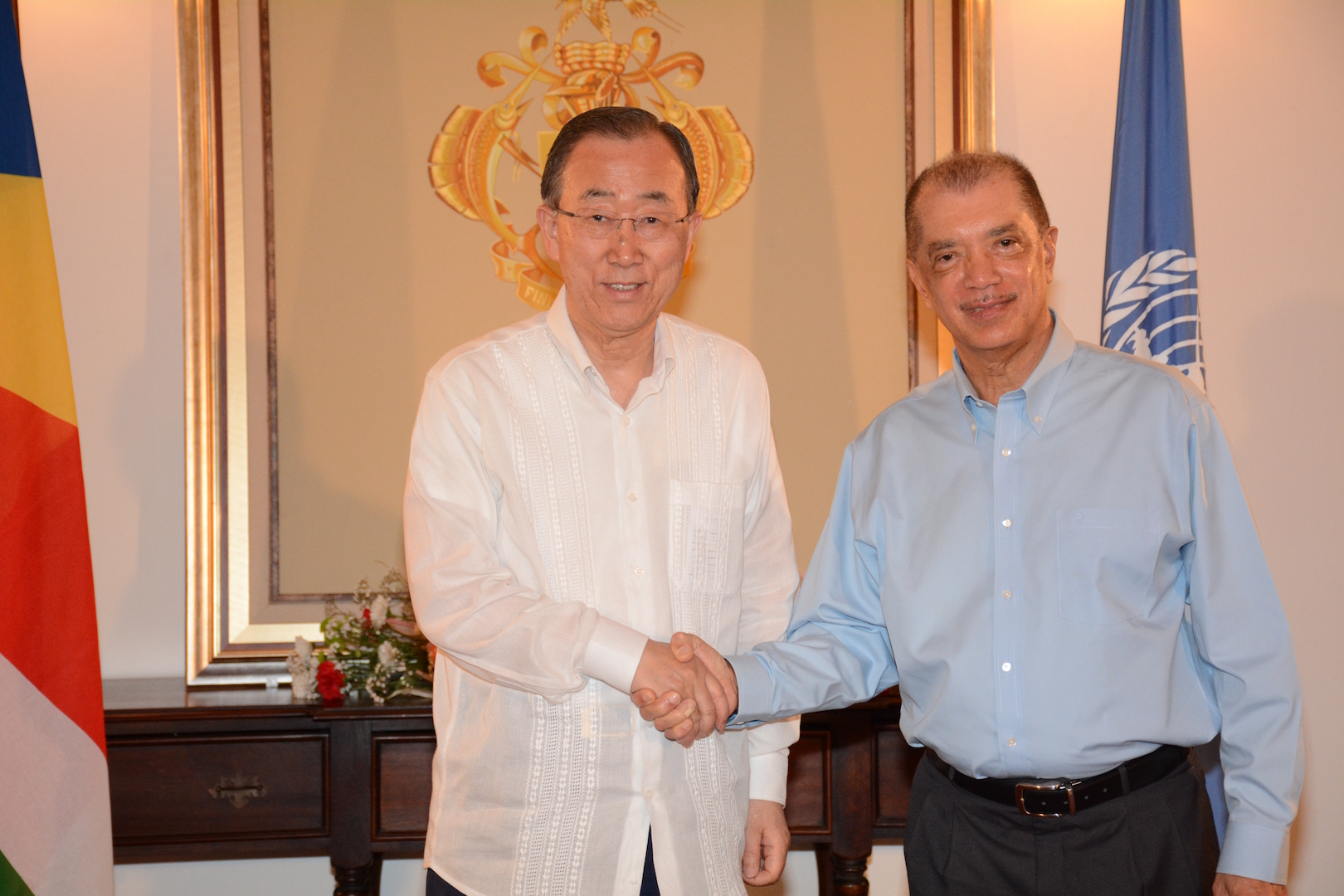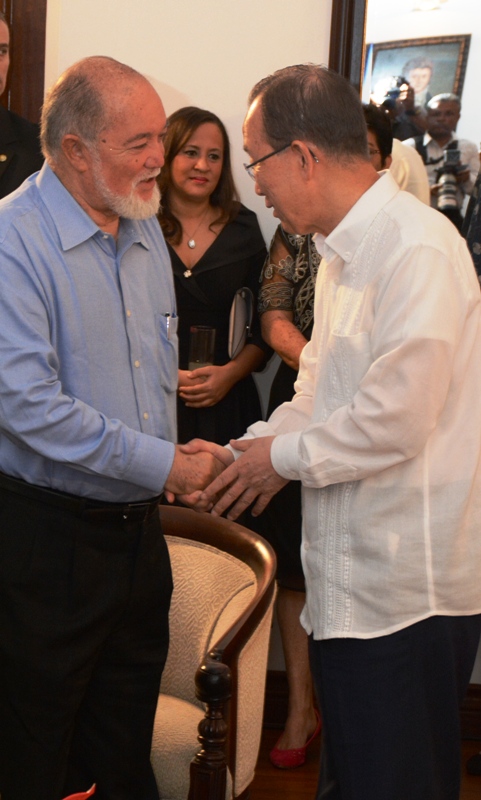Seychelles UN-Friendly Encounter
THE visit of the UN Secretary General, His Excellency Ban Ki-Moon to Seychelles from Saturday 7 and 8 of May can certainly be described as an important and friendly encounter between the representative of the longest lasting and most universal international political body in the world and the Republic of Seychelles represented by its current President James Alix Michel.

The two days visit went by in a flash .... ending with both parties understandably praising each other for the success of this historic event.
Understandably, the accepted agenda converged on areas of common interest like piracy, maritime security, global warming, and of course the Blue Economy, an area which was singled out as demonstrative of the leadership quality of President Michel who has been at the forefront of the initiative to proclaim and to bring to international awareness the plight of small island nations whose interests have been overlooked and neglected in the past.
There was of course no mention of yesterday’s claim that Seychelles should get a non-permanent seat on the Security Council and no mention of the fact that the question of succession to Mr. Ban Ki-Moon is today an international talking point with many wondering that the time had come for the next Secretary General to be a lady.
Whilst Secretary General Ban Ki-Moon has certainly revitalised the international body since he assumed the august position as the world’s most important civil servant, unfortunately several of the outstanding questions are not constitutionally within his competency to solve.
As we know, the United Nations replace the inter-war League of Nations in an attempt to ensure world peace and secure the economic, social and political conditions under which this can be achieved. It started as an agreement between the allies fighting Hitler’s Axis Powers in the Second World War and much of its structure and subsequent problems followed from this. The charter originated from discussions held at Duambarton Oaks, Washington DC in 1944 between the USA, the United Kingdom, the USSR and later China and the charter was signed in June 1945 when I was only 6 years old. It had an initial membership of 51 countries. Seychelles, when it became a sovereign nation under my presidency in June 1976 became its 145th member and today the United Nations is a club with nearly 200 members.
The UN’s wartime origins show also in its basic organisations. The most important organ of the UN is the Security Council, in permanent session and charged with maintenance of international peace and security, including calling on the member states to put together peace keeping forces to monitor ceasefires and conflicts and specific disputes. The body has 15 members of which 5 are permanent. They are, in effect, the main victorious allies of the Second World War – the USA, Russia (having inherited the seat of the USSR in 1991), the UK, France and the People’s Republic of China who, in a controversial move replaced Taiwan who had been a founding member in the UN. The 5 permanent members each have an absolute veto on Security Council resolutions. First, it can be said that the international power balance was effectively freeze-framed in 1945 and anyone which is a permanent member has frequently been able to block effective UN actions. Until and unless this situation is looked into, the role of the Security Council and its membership will remain a subject of controversy and beyond the competency of the Secretary General to solve.
The other main organ, the General Assembly, consists of all members who can debate and pass resolutions on any matter covered by the charter, except for disputes already on the agenda of the Security Council. However today it has become largely regarded as being a propaganda area and an ideological battlefield to which few nations in conflict pay any attention.
Needless to say, perhaps the most important work of the UN apart from security matters are those done by the Specialised Agencies and by the direct personal diplomacy of the administrative head, the Secretary General. Up to now, the Secretaries General of the UN have nearly all been extremely widely respected International states people whose personal interventions have often been of great help. In this respect we cannot under look and under value the position of the Secretary General who sits at the top of the Specialised Agencies such as the World Health Organisation, the International Labour Organisation, the UN High Commission for Refugees, the International Court of Justice, and others.
The funding of the UN however remains the subject of continuing controversies with major contributors like the USA often taking the view that “he who pays the piper should call the tune”. In this respect the United Nations as a body must remain concerned that the politics of “might is right” does not override the politics of “right is might”.
In conclusion, seen in realistic perspectives, the world must indeed appreciate how things would be much worse especially for small nations if this body did not exist, within the spirit that “talk talk is better than war war”.
Incidentally this morning I have received a poem written by my friend David Krieger, President of the Nuclear Age Peace Foundation, an organisation which is committed to a world free of nuclear weapons, entitled ‘Earth day”, which I would like to share as the concluding paragraph of this opinion page. But before doing so I would like to wish Secretary General Ban Ki-Moon and Mrs Moon bon voyage and to assure them, just as President Michel did, that a warm welcome awaits them in Seychelles at any time and that after their retirement Seychelles will constitute a great destination for a second honeymoon and offers them an excellent environment to reflect and to pen their respective memoire for the benefit of this generation and its posterity.
Earth Day
We celebrate a small planet,
made large by who we are,
a planet in shock,
rotating around a lonely star.
We honour our water planet,
with its oceans, lakes, rivers, streams,
with its mountains, valleys, desserts,
plains and forest dreams.
We rejoice in this speeding planet,
paying tribute to our pale blue dot,
trying to keep it healthy , peaceful
and not too hot.
We bow deeply to our only planet,
knowing we need it to survive.
despite all we’ve done to harm it,
we must change course
and make it thrive.
We vow to be worthy stewards,
tending to our planetary home each day
and, like the Little Prince, still take time
to love and play.
By Sir James R Mancham
Source VIOAS
Opinions expressed are those of the author and do not necessarily reflect those of OCEANUSLive
 Subscribe to our newsletter. Receive a weekly round-up of all piracy-related & maritime situational awareness news.
Subscribe to our newsletter. Receive a weekly round-up of all piracy-related & maritime situational awareness news.
OCEANUSLive.org
Information, Security, Safety; Shared
Submitted by Team@oceanuslive.org